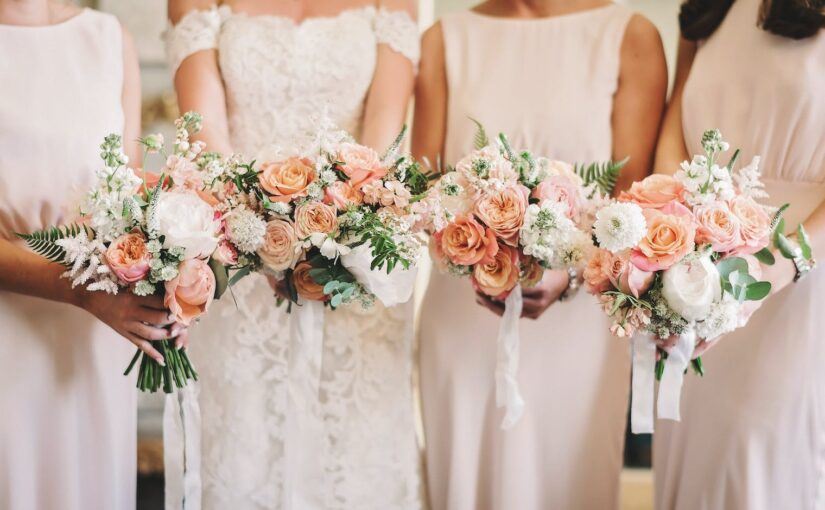Wedding flowers are a major part of the day for most couples: it’s one of the big questions you get from family and friends alike. Have you set the date? Have you got your dress? What flowers are you going to have?
However, the flowers you have at your wedding will often go much further than the bridal bouquet. There are also flowers for the bridesmaids, table centrepieces, gifts for the new in-laws, corsages, flower girls…
But how much do wedding flowers cost? In this post, we’re going to discuss everything from bouquets to boutonnières, including the average cost of wedding flowers, what’s included, and the cost of the most common wedding flowers.
What’s the average cost of wedding flowers?
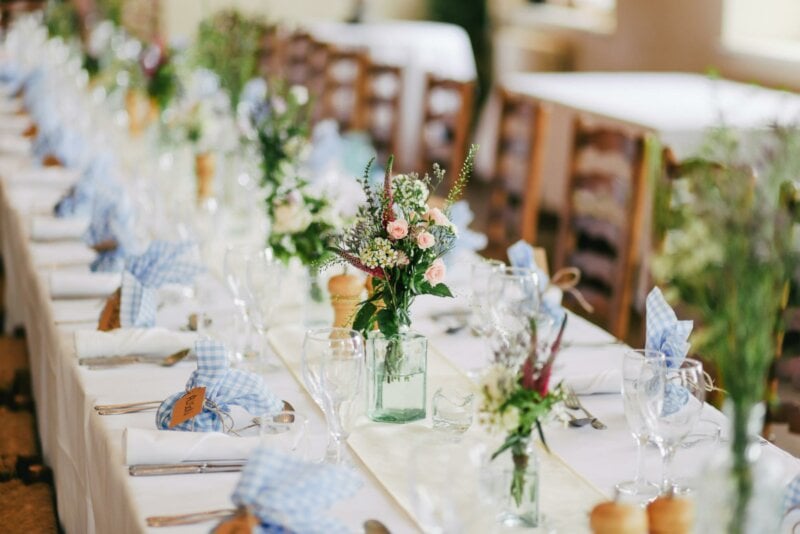
While not one of the biggest costs to think about during your wedding, in our ultimate wedding budget breakdown you can discover that the average cost of wedding flowers in Canada is between $1,000 – $2,000.
Of course, this figure can vary dramatically depending on what you’re looking for. The bigger and bolder you go, the more you might expect to pay. Similarly, if you’re looking for less flora and more fauna at your wedding, the cost of your flowers will be much lower.
Regardless of your budget, there are plenty of options to get stunning flowers for your wedding. The budget levels can be broken down as:
- Affordable – From $200
- Moderate – $1,200 – $2,200
- Luxury – $2,200 – $3,200
- Super Luxury – From $3,200
These ranges provide a flexible guide, considering regional flower prices and seasonal variations. For example, opting for local, in-season flowers can help save costs, while luxury arrangements often include custom installations and premium flower choices.
What does this cost include?
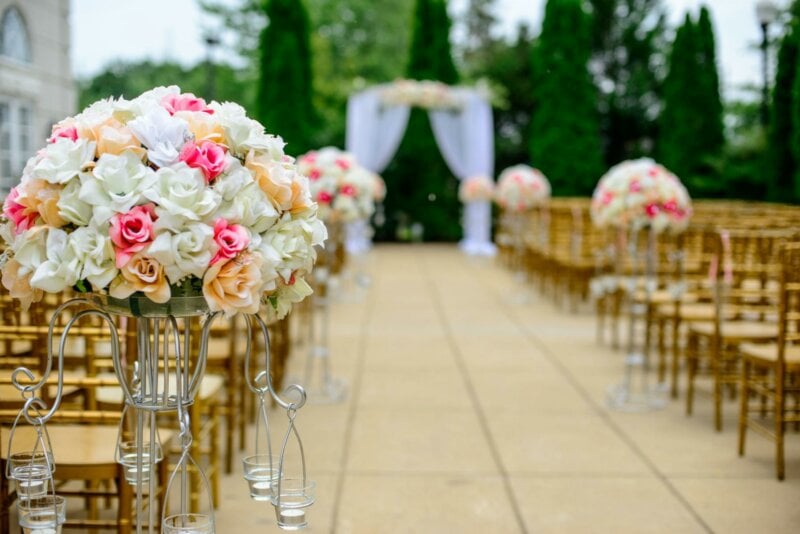
What exactly is included in the cost of your wedding flowers depends on the vendor, so go in with the right questions to ask your florist before making your final decision.
The average cost will be made up of a package that likely includes:
- 1 x Bridal Bouquet
- 2 x Bridesmaids Bouquets
- 6 x Buttonholes
- 2 x Large Vase Arrangements for the Ceremony
- 1 x Arrangement for the registrar’s table
- 8 x Reception Flowers for 8 tables
Also included in that overall cost will be:
- Consultation
- Design
- Conditioning and prepping the flowers
- Accessories (for example, vases and mirrors)
- Delivery
- Installation
What’s the average cost of a wedding bouquet?
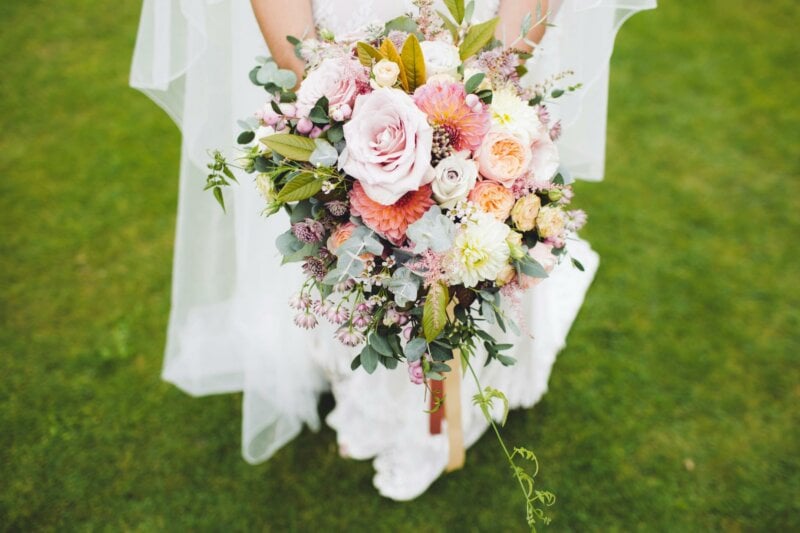
The average cost of a wedding bouquet is around $140. Generally, the most affordable option is a hand-tied bouquet (perfect for a rustic wedding), as it doesn’t require intricate wiring from the florist. Hand-tied bouquets use flowers with longer stems, which are easier to arrange. In contrast, a cascading bouquet requires specialized wiring to achieve that stunning waterfall effect, which can significantly increase the cost.
Why do wedding flowers cost so much?
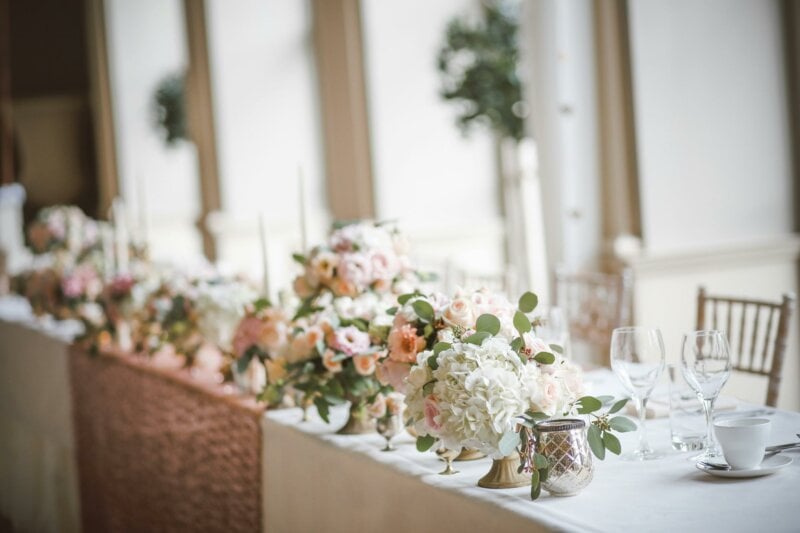
When it comes to choosing your wedding flowers, you’re not going to want the same kind of arrangements you’d have at home day-to-day – it’s your wedding day after all. Whereas usually you might be happy with a bunch of supermarket flowers – or perhaps something from the local florist when you’re feeling fancy – your wedding flowers will be big, bold, beautiful and in keeping with the rest of your day. There are also a lot of individual arrangements needed to fit a very specific brief – which ‘off the shelf’ arrangements might not meet.
Wedding flowers cost so much because:
- You’re receiving a bespoke, personalized service
- They take florists a long time to design
- Delivery and setup can be time-consuming
- Flowers are often fairly pricey anyway
This is all not to say that, even if you have a budget below the average, your flowers won’t be stunning – far from it. However, there are reasons why your specific choices might bump up the price.
What factors affect the cost of wedding flowers?
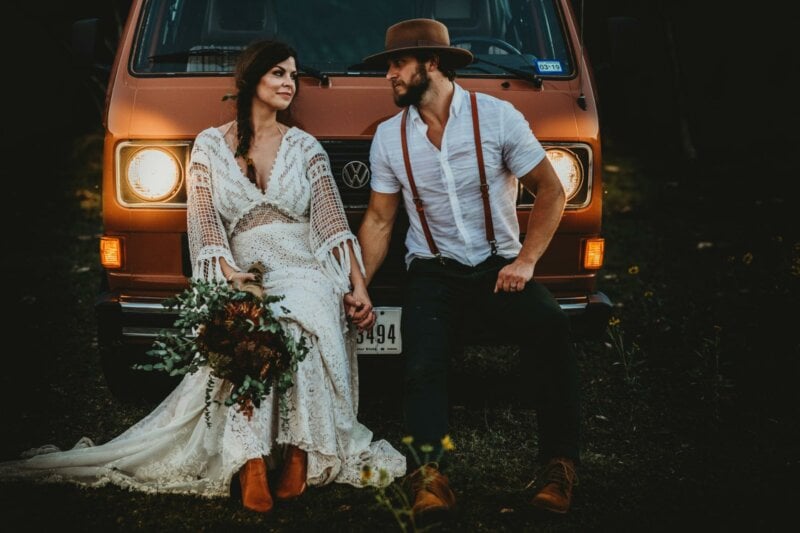
Almost three-quarters of all couples hire a professional florist when planning their wedding. Flowers may be an expensive part of the big day, but for many couples they’re imperative. However, many factors can affect the cost of your wedding flowers that, if you’re mindful, can keep you within your budget.
Seasonality
Depending on the time of year you’re getting married, certain flowers may be more readily available than others. The more in-season your flowers are, the more affordable and eco-friendly your wedding arrangements will be. Choosing local, in-season blooms helps support Canadian growers and reduces the carbon footprint associated with importing flowers.
Here are some great seasonal flowers in Canada:
- Spring: Tulips, Peonies, Lilacs
- Summer: Sunflowers, Dahlias, Irises
- Autumn: Roses, Hydrangeas, Asters
- Winter: Carnations, Amaryllis, Orchids
The type of flowers
Roses may be the traditional wedding flower, but they’re also some of the most expensive, particularly if you’re keen on unique colors. Alternatives, such as hydrangeas offer stunning, colorful blooms but can be more budget-friendly.
Skill and experience
It may seem obvious, but a skilled and experienced florist with decades of experience will cost more than someone new to the industry.
Flower blooms
Believe it or not, another factor that can affect the cost is the physical appearance of your chosen blooms. For example, orchids only have a two-inch stem and will require a faux stem if you want to add them to your bouquet. This is intricate, time-consuming work that can bulk up the price. They do look beautiful though…
Sources
Are your chosen flowers available from Canadian suppliers? Importing flowers from other regions, especially during off-seasons, can drive up costs due to shipping fees and supply chain complexities. In contrast, Canadian-grown flowers are typically more affordable and readily available, particularly if you choose blooms in season.
Accounting for delicate flowers
When you order arrangements that include delicate flowers, there is always going to be the risk that they’re damaged, not open, or past their prime. If you ask for a bouquet that includes a dozen roses, your florist will have to over-order to make sure to account for these issues.
What to consider when choosing your wedding flowers
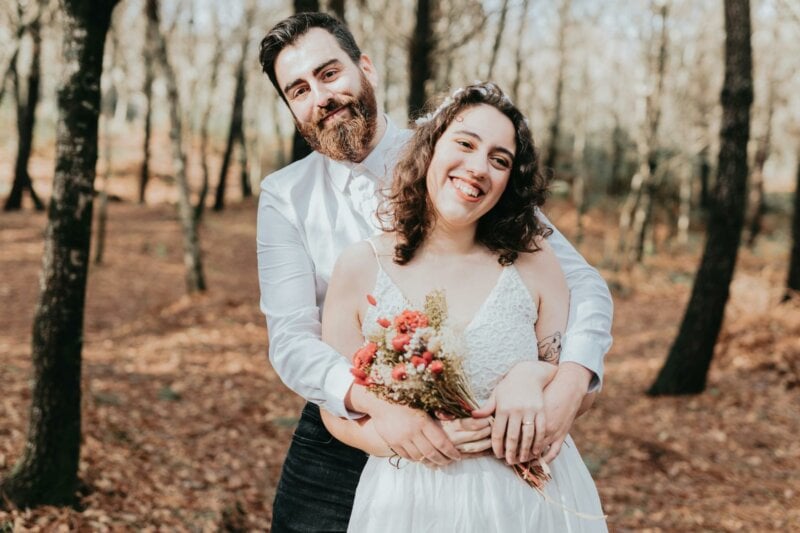
Choose a bouquet that fits the size and shape of your dress (if you’re wearing one). For example, the bouquet should be in proportion to the dress – the bigger the dress, the bigger the bouquet. You don’t want a slender, figure-hugging dress to be hidden by a large bouquet, after all.
Another option to consider is silk flowers. While silk flowers were once significantly cheaper than real ones, advances in manufacturing have brought their prices in line with, and sometimes even higher than, fresh blooms. The upside is that modern silk flowers can look incredibly lifelike. If you’re seeking a natural touch without the perishability, preserved flowers are a fantastic alternative. They’re real blooms that have been specially treated to last, giving you the authenticity of fresh flowers with the longevity of silk ones.
Opting for silk or preserved flowers can be a great choice if you’re concerned about unpredictable weather, have allergies like hay fever, or want a lasting keepsake from your wedding day. However, keep in mind that artificial and preserved flowers won’t offer the natural fragrance of fresh bouquets. To capture that special scent, consider choosing a floral perfume that will always remind you of your big day.
Plan your wedding today with Bridebook
Are you starting your wedding planning journey? Sign up to Bridebook and begin planning your wedding today.
And if you’re looking for ways to save money on your wedding flowers, we’ve got plenty of budget-friendly ideas and inspiration to help you keep costs down.
You Might Also Like…
- The Ultimate Canadian Wedding Budget Breakdown
- How Much Does a Wedding Venue Cost in Canada?
- How Much Does a Wedding Catering Cost in Canada?
- How Much Does Wedding Photography Cost in Canada?
